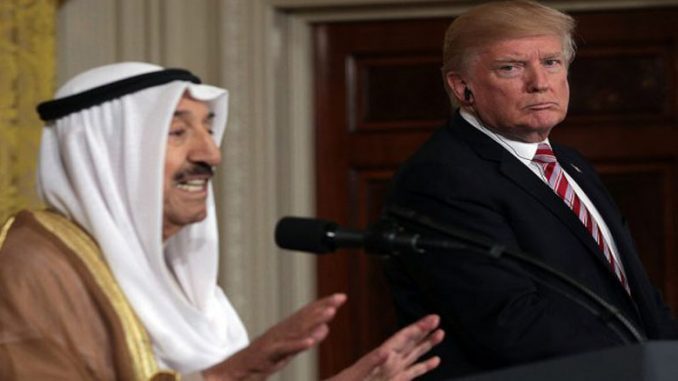
Kuwait best get with the US program – or be prepared to face Trump’s wrath
The New York Post has published a report by Jonathan Schanzer* & Varsha Koduvayur* about the relation between Kuwait and the United States under Donald Trump’s Administration, particularly after Kuwait’s recent position in the United Nations about the Israeli-Palestinian developments.
The United Nations Security Council has recently failed to adopt two competing draft resolutions; one produced by Kuwait, in response to the killing of dozens of Palestinian protesters in Gaza, and the other tabled by the United States, which vetoed the initial resolution saying it was “grossly one-sided” against Israel. Kuwait, a non-permanent council member that represents Arab countries, has blocked a US-drafted United Nations Security Council statement that strongly condemned an attack by Gaza fighters on Israel recently. Kuwait said it blocked the US-drafted statement to allow for consideration of a draft resolution it has put forward on the protection of Gazan civilians. Earlier, Kuwait blocked another US-proposed statement that criticised Palestinian Authority chairman Mahmoud Abbas’ remarks about Jews and the Holocaust as “unacceptable.”
“There’s a new hitch in President Trump’s plan to form a united front among Gulf states and Israel against Iran,” the report sys.
Kuwait’s ambassador to the United Nations this month lambasted Israel, charging the Jewish state with “deploying a vast and well-developed arsenal of weaponry against an unarmed people.” A Kuwaiti cleric, just weeks later, denied the Holocaust and the existence of gas chambers, claiming the scale was impossible: “How many ovens would you need to burn 6 million human beings?”
Of course, this is a notable exception to the pattern of Gulf Arab states lately increasing their outreach to Israel. Saudi Crown Prince Mohammed bin Salman tacitly acknowledged Israel’s right to exist in April. The UAE and Bahrain sent national teams to compete in the first leg of a major cycling race this spring in Israel. In June, an Israeli delegation visited Bahrain, and in May, Bahrain’s foreign minister tweeted about Israel’s right to defend itself.
Kuwait remains staunchly resistant to this trend. It’s the one “conservative Gulf Arab state” that still engages in the systematic condemnation of Israel. To put this in perspective, even Hamas-supporting Qatar maintains low-level ties with Israel.
For Saudi Arabia, the United Arab Emirates and Bahrain, it all comes down to their shared concerns over Iranian adventurism and the 2015 Iran nuclear deal. As Mohammed bin Salman said, Iran’s supreme leader “makes Hitler look good.” So they have sought out Israel, which has stood up to Iranian aggression — both by striking Iranian assets in Syria and even stealing nuclear secrets out of Iran.
Kuwait, however, maintains neutrality with Iran. It doesn’t need Israel as a partner to challenge the regional aggression of the Islamic Republic, and it’s trying to keep it that way.
Moreover, in Kuwait’s political system, being anti-Israel is just good politics. In October, Kuwait’s speaker of parliament Marzouq al-Ghanim lashed out at two Israeli Knesset members, calling them “occupiers and child murderers.” Amid applause, al-Ghanim yelled at the Israelis, “grab your bags and leave this hall.” As thanks, Palestinians named him “Personality of the Year 2018.”
In May, Islamist MP Waleed al Tabatabai decried Israelis as “Zionist dogs” after the IDF struck Iranian targets in Syria. Tabatabai famously visited Syrian rebels in Idlib and was photographed wearing a rebel uniform while holding a gun. In early June, another MP thanked the Kuwaiti people, emir and government for their permanent, resolute response to the “Zionist occupation.”
The popularity of Israel-bashing in Kuwait’s political system can also be explained by the prevalence of Salafis. Their political power is actually derived in part by their fierce opposition to Israel and blatant anti-Semitism. The monarchy co-opted Kuwait’s Islamists as a bulwark against its opposition following anti-government protests in 2011. The emir plays the Salafis and the Muslim Brotherhood off each other, while encouraging both to serve as counterweights to domestic opposition.
Salafis’ influence may also explain Kuwait’s abysmal terror-finance record. Three individuals currently under US sanctions for funding al Qaeda are also faculty members at state-funded Kuwait University, earning public benefits. The Revival of Islamic Heritage Society — which the US Treasury designated as a terror group in 2008 for funding an al Qaeda network — still operates in Kuwait.
Kuwait’s opposition to Israel has hardened since becoming a rotating member of the UN Security Council. Kuwait has stymied US efforts to censure Palestinian leader Mahmoud Abbas for an anti-Semitic speech, and it has blocked US condemnation of Hamas attacks against Israel from Gaza. Reports suggest that Jared Kushner, feeling undermined by Kuwait’s efforts, held a “brief and stormy” meeting with the Kuwaiti envoy to Washington.
Kuwait is clearly signaling its intent to dissent from Saudi Arabia, the UAE and Bahrain on normalization with Israel. But if Trump’s regional peace plan is released in the coming weeks or months, Kuwait may be caught in the crossfire.
Defying the United States is quite different from maintaining independence in an internal Gulf Cooperation Council squabble. Nor is there likely room for nonalignment in Trump’s strategy to contain Iran.
*Jonathan Schanzer is senior vice president at Foundation for Defense of Democracies.
*Varsha Koduvayur is a senior research analyst on the Gulf Arab states.



